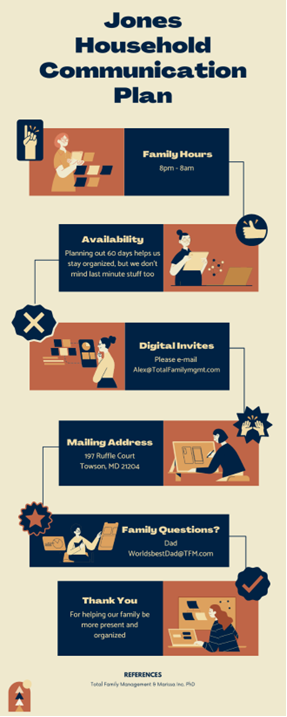Family Communication Plan
Well-run businesses spend time making sure they have the best resources. It’s such a default setting that we rarely give it too much thought. Teams of great people work together to come up with fantastic ideas and make sure the business runs smoothly and successfully. The same people then head home (or down the stairs from their work at home office) at night and are left to deal with their family, personal, and household problems with little to no support. Not anymore.
TFM is the resource families have been looking for to start thriving. We’re bringing the most effective principles from the boardroom into the living room and continue to ask what else could we borrow from businesses?
Family Hours
Businesses have many goals, but one of them is commonly to serve their customers. Families don’t have customers, but they do have members who need support from one another. Businesses have hours and those hours are understood, published, and respected. There’s no way to trade stocks on Sundays or walk into the dry cleaner on Christmas Day, and because those hours are understood, no one even tries. But that is not the case with families. Employers, salespeople, and organizations have no problem emailing, calling, or texting us at any time of the day or night. Maybe families need posted hours of operation too?
The truth is, we as a country have let our work lives blend and blur with our personal lives. With constantly evolving technologies, aimed at keeping all of us connected, we’ve lost sight of conventional “hours”. What used to be that 9am-5pm is now a 7am-11pm (or whenever you’re in front of your phone, really). Perhaps it’s time to create some real boundaries?
Technology is taking away from our good old fashioned family and personal time. Now, more than ever, we find ourselves in an era where we need to create time. Maybe we set aside the phone and plug back into our life. We can all agree that not everything is an emergency and true emergencies are few and far between. For example, emergencies that required a doctor on a commercial flights happened .001% of the time or 1 out of 600 flights. What’s the likelihood that you really need to read that text?
Research has shown that technology use can negatively impact how we connect with partners, children, and the world around us. It shows up in how attentive we are, the state of our emotional and mental health, and how we spend time with those we care most about. The need to be constantly connected to our phones and work has been built into our societal expectations: high accessibility, 100% availability. To counteract this, we encourage families and individuals, to create agreed upon boundaries and expectations on cell phone use, to turn on the Do Not Disturb and tune into family and personal connections. This is a household and family decision that is worth a chat over dinner.
Tried and true
We have tested this approach with TFM households and we feel confident saying very simply, it doesn’t hurt. We’re directionally correct. Maybe ask yourself this, in 5 years will you look back and wish you spent more time on your phone? More time being distracted?
One of the things we heard from our test cases was that “Family Hours'' realigned everyone’s expectations around response times. The families of TFM are inundated with text messages, e-mails, phone calls, voicemails, Instagram notifications, and plain old snail mail. They feel like it’s impossible to dig out and impossible to feel caught up. It may simply be because catching up is in fact impossible. There will always be more notifications and emails, but our time together is very limited. TFM’s Family Communication Plan releases a bit of that stress by letting people know the following:
- Family Hours: During this time, don’t expect to hear from members of our family. We’re unwinding, spending time together, or are just offline living our life. It doesn’t mean that it’s impossible to reach us, it just means we’re limiting the distractions and are in control of our attention.
- Make Hours Public: What’s the point of hours if you don’t post them? Over time, TFM families have said people just don’t reach out at night or early in the morning, etc. The same way you wouldn’t go to a bank on Labor Day, you might wait until the next day to reach out to a family. Some families have linked their hours in their personal e-mail signatures.
- Share Preferences: What’s your preferred form of communication? If something is time sensitive vs. not, does that change? For example, text us if it’s urgent, e-mail us if it’s not. This is also key to staying organized as a family unit.
- Calendar Preferences: Do you like when people send calendar invites? Who should they include as invitees? Many people don’t realize that using a digital calendar is less about keeping yourself organized and more about keeping everyone on the same page.
- Thank you: Ultimately, like working out, staying more organized and present with your family is a goal of a lot of our clients and their friends will want to support them
This process is specifically about phones and tablets and things with notifications, not necessarily about screen time. In fact, we think a family watching a movie together without phones is a wonderful family bonding activity. Will a family communication plan work for your family? We don’t know, but the risk is small and the payoff is huge.
We’re including an example from a client below. If you try the family communication plan, contact us and let us know how it works, but don’t expect a response between 8pm – 8am, those are family hours. 😊
Example

